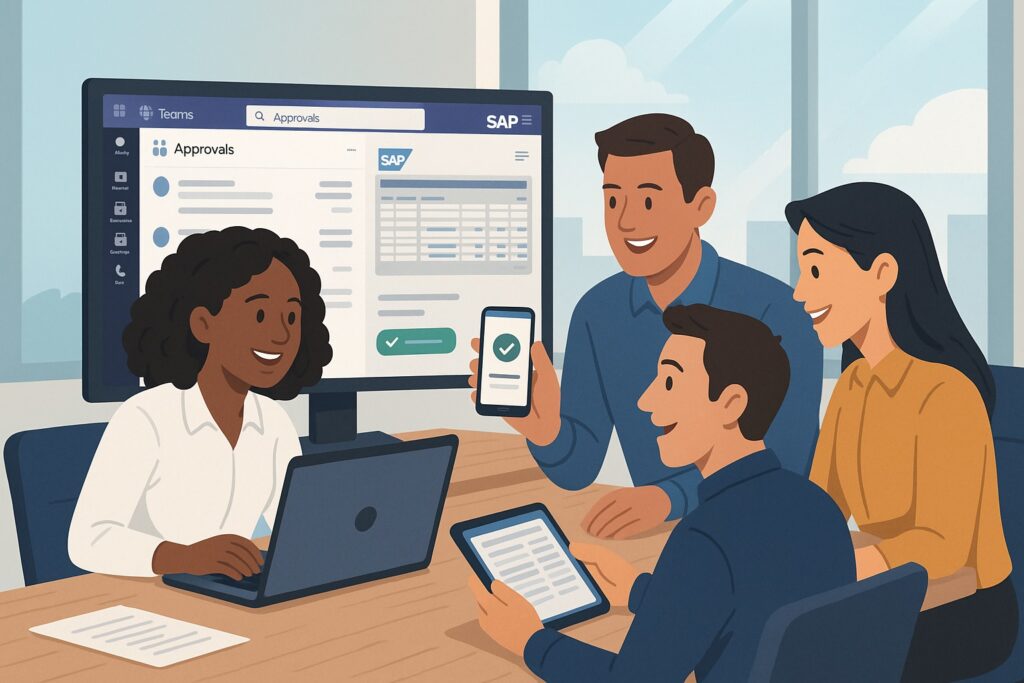The Generational Divide: Why Your Best SAP Talent is Looking Elsewhere
The Generational Divide: Why Your Best SAP Talent is Looking Elsewhere
"I spend more time chasing approvals than analysing data" – a comment that captures the frustration of talented SAP professionals trapped in fragmented workflows that prevent them from delivering their highest value. While your most skilled team members joined to solve complex business problems and drive strategic decisions, they find themselves drowning in manual coordination tasks that feel antiquated compared to the integrated technology experiences they expect.
This isn't just about individual productivity—it's about talent retention, competitive positioning, and organizational capability development in increasingly competitive labour markets. When your best SAP professionals feel frustrated by inefficient workflows, they become flight risks for competitors offering more streamlined work environments.

The Modern Workforce Reality
Today's SAP professionals operate in a fundamentally different technology landscape than the one that shaped traditional ERP workflow design. The generational divide isn't just about age—it's about technology expectations, work style preferences, and career development priorities.
Digital Native Expectations
Younger employees who grew up with integrated consumer technology platforms expect business systems to work with similar seamlessness. When they experience context switching between SAP screens, email notifications, and Teams conversations, the fragmentation feels unnecessarily complex and inefficient.
Consumer Technology Context: Modern professionals use smartphones that seamlessly integrate communication, information access, and productivity tools. When business workflows require manual coordination across disconnected applications, the experience feels outdated and frustrating.
Collaboration Preferences: Millennials and Gen Z workers strongly prefer collaborative work environments and real-time communication. Email-based SAP workflows that isolate decision-making feel disconnected from their preferred working styles.
Efficiency Prioritization: Research from Great Place to Work shows that younger employees particularly value efficient, streamlined work processes. Organizations with fragmented workflows may struggle to attract and retain top talent who have options with more modern technology approaches.
Experienced Professional Frustrations
Long-tenured SAP professionals face different but equally significant challenges:
- Career Value Erosion: Senior analysts and managers who built careers on strategic thinking find themselves spending increasing time on administrative coordination rather than value-adding work.
- Efficiency Regression: Professionals who remember when business processes felt more streamlined become frustrated when modern technology creates more complexity rather than simplification.
- Competitive Disadvantage: Senior professionals recognize that inefficient internal processes create competitive disadvantages but often lack authority to implement comprehensive solutions.
The Talent Retention Crisis
Technology frustration has become a major factor in employee disengagement and turnover intention, with SAP environments particularly vulnerable due to workflow complexity:
The Administrative Burden Problem
Time Allocation Analysis: Research indicates that knowledge workers spend 60% of their time on administrative tasks rather than strategic work. For SAP professionals, this percentage increases due to approval tracking, email coordination, and manual follow-up requirements.
Skill Utilization Gaps: Organizations invest heavily in recruiting talented SAP professionals with financial analysis and strategic thinking capabilities, then trap them in administrative workflows that underutilize their expertise.
Career Development Impact: When talented professionals spend more time coordinating approvals than developing business insights, their skill development stagnates and career progression slows.
The Cooperation Breakdown
Great Place to Work research reveals that in high-performing companies, 84% of employees say they can count on colleagues to cooperate, compared to 65% in typical workplaces. However, cooperation becomes difficult when approval processes force people into administrative roles instead of collaborative problem-solving.
Team Coordination Challenges: When SAP workflows require email chasing and manual status tracking, team members spend more time coordinating than working together on business outcomes.
Information Accessibility: When business context and decision rationale are scattered across email threads, team members lack the shared understanding necessary for effective cooperation.
The Technology Expectation Gap
Modern Work Environment Standards: Professionals increasingly expect business technology to enable rather than hinder productivity. When SAP workflows create friction and inefficiency, they clash with modern workplace expectations.
Remote Work Compatibility: The shift toward hybrid work requires business processes that function seamlessly across devices and locations. Traditional SAP workflows designed for desktop-centric environments feel increasingly outdated.
Mobile Decision Expectations: Modern professionals expect to make business decisions anywhere, anytime, through mobile-optimized interfaces. Email-based SAP workflows that require desktop access create frustrating limitations.
The Skills Development Stagnation
Fragmented workflows don't just reduce immediate productivity—they limit long-term professional development:
Strategic Thinking Erosion
Analysis vs. Administration: When SAP professionals spend significant time tracking approvals, they have less time for strategic analysis and business insight development.
Deep Work Limitation: Complex business analysis requires sustained concentration. Frequent interruptions from approval coordination prevent the deep work necessary for advanced skill development.
Leadership Preparation Gaps: Future business leaders need experience with strategic decision-making and collaborative problem-solving, not administrative coordination.
Technical Skill Development Challenges
Advanced SAP Capabilities: Learning sophisticated SAP functionality requires sustained practice. When users spend most time switching between applications, they don't develop advanced system capabilities.
Process Optimization Expertise: Understanding workflow optimization requires experience with streamlined processes, not fragmented coordination.
Career Advancement Implications
Visibility and Recognition: Administrative coordination work provides little visibility compared to strategic analysis and business improvement contributions.
Market Value Enhancement: Modern SAP professionals need experience with integrated workflows and collaboration platforms to remain competitive in evolving job markets.
The Competitive Talent Landscape
Organizations with fragmented SAP workflows face increasing disadvantage in competitive talent markets:
Recruitment Challenges
Candidate Expectations: Top SAP talent increasingly expects modern, efficient work environments that enable strategic contribution rather than administrative coordination.
Technology Assessment: Skilled professionals evaluate potential employers based on technology sophistication and workflow efficiency, not just compensation and benefits.
Reputation Impact: Organizations known for inefficient internal processes struggle to attract top talent who have options with more streamlined competitors.
Retention Competition
Alternative Opportunities: Skilled SAP professionals have multiple employment options, and many competitors offer more integrated work environments.
Career Development Competition: Organizations offering modern workflow experiences and advanced skill development opportunities attract talent from competitors with outdated processes.
The Teams Integration Solution
Microsoft Teams integration addresses the generational divide by creating work environments that meet modern productivity expectations:
Unified Work Environment
Single Platform Collaboration: Teams integration brings SAP workflows into the collaboration environment where modern work happens, eliminating frustrating fragmentation.
Real-Time Coordination: Instant collaboration capabilities replace email coordination with real-time discussion that matches modern work pace expectations.
Mobile-First Accessibility: Native mobile functionality enables anywhere, anytime business decisions that support flexible work arrangements.
Strategic Work Focus
Administrative Automation: Automated approval tracking eliminates the manual follow-up tasks that prevent strategic work focus.
Collaboration Enhancement: Real-time teamwork capabilities enable collaborative problem-solving rather than isolated email coordination.
Decision Authority: Streamlined approval processes enable faster decision-making and greater professional autonomy.
Career Development Acceleration
Advanced Skill Application: Efficient workflows provide more time for strategic analysis, advanced SAP capability development, and business insight generation.
Process Innovation Opportunities: Integrated platforms enable professionals to identify and implement workflow improvements that demonstrate business impact.
Technology Expertise Development: Experience with modern integration platforms enhances market value and career advancement potential.

The Strategic Choice
Organizations implementing Teams integration through platforms like Looply can transform frustrating, fragmented workflows into efficient, collaborative environments that attract and retain top SAP talent. The technology exists to eliminate the generational divide and create work environments that satisfy both digital natives and experienced professionals.
The choice is clear: transform workflows to meet modern workforce expectations, or accept ongoing talent retention challenges as top professionals seek more efficient work environments with competitors.
Ready to assess your organization's talent retention risk and explore workforce satisfaction solutions?
Download the Complete Workforce Analysis: "The Hidden Productivity Crisis in SAP Organizations"
This comprehensive white paper provides detailed talent retention frameworks, workforce satisfaction assessment tools, and implementation strategies for creating work environments that attract and retain top SAP professionals.



